2018 Walter A. Strauss Lecture Series – Pacifists Making Guns: The Galton Family and Britain’s Industrial Revolution
September 17th, 2018
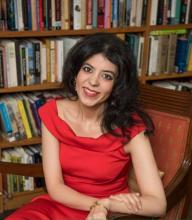
In this series of lectures, Priya Satia, Professor of Modern English History at Stanford University, will examine how people with conscience have committed unconscionable acts in the modern period. In some ways, the “modernity” of the modern period lies precisely in the growing awareness of conscience as an ethical rather than religious quality–a new self-consciousness about conscience. This understanding of conscience was tied to the modern historical sensibility; it depended on a sense of how much agency, and thus responsibility, humans have in shaping their world and their lives. Professor Satia will examine this phenomenon in three lectures covering key moments in the history of the British empire: the question of a Quaker gun-maker’s conscience in the period of the industrial revolution; the way British officials professing deep understanding and love for the Middle East invented a violent regime of aerial policing there during World War One; and how the violence among neighbors during decolonization in postwar South Asia weighed on the conscience of all those involved.
2018 Walter A. Strauss Lecture Series – The Defense of Inhumanity: Interwar Air Control and the British Idea of Arabia
September 19th, 2018

In this series of lectures, Priya Satia, Professor of Modern English History at Stanford University, will examine how people with conscience have committed unconscionable acts in the modern period. In some ways, the “modernity” of the modern period lies precisely in the growing awareness of conscience as an ethical rather than religious quality–a new self-consciousness about conscience. This understanding of conscience was tied to the modern historical sensibility; it depended on a sense of how much agency, and thus responsibility, humans have in shaping their world and their lives. Professor Satia will examine this phenomenon in three lectures covering key moments in the history of the British empire: the question of a Quaker gun-maker’s conscience in the period of the industrial revolution; the way British officials professing deep understanding and love for the Middle East invented a violent regime of aerial policing there during World War One; and how the violence among neighbors during decolonization in postwar South Asia weighed on the conscience of all those involved.
2018 Walter A. Strauss Lecture Series – The Self Divided: The Partition of 1947
September 21st, 2018

In this series of lectures, Priya Satia, Professor of Modern English History at Stanford University, will examine how people with conscience have committed unconscionable acts in the modern period. In some ways, the “modernity” of the modern period lies precisely in the growing awareness of conscience as an ethical rather than religious quality–a new self-consciousness about conscience. This understanding of conscience was tied to the modern historical sensibility; it depended on a sense of how much agency, and thus responsibility, humans have in shaping their world and their lives. Professor Satia will examine this phenomenon in three lectures covering key moments in the history of the British empire: the question of a Quaker gun-maker’s conscience in the period of the industrial revolution; the way British officials professing deep understanding and love for the Middle East invented a violent regime of aerial policing there during World War One; and how the violence among neighbors during decolonization in postwar South Asia weighed on the conscience of all those involved.
A Conversation with A. Van Jordan
September 26th, 2018
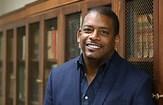
Poet and previous Anisfield-Wolf Book Award winner A. Van Jordan will be in conversation with Dave Lucas, Ohio’s Poet Laureate and an instructor in the CWRU Department of English. Born in Akron, Ohio, A. Van Jordan received his Masters of Fine Arts from the MFA Program for Writers at Warren Wilson College. He is also a graduate of the Cave Canem Workshop. His first book, Rise, won the PEN Oakland/Josephine Miles Award and was a selection of the Academy of American Poets book club. He has received a Whiting Writers Award, the Gilbert-Chappelle Distinguished Poet Award, and a Pushcart Prize. He received the Anisfield-Wolf Book Award for Nonfiction for his book Macnolia, which focuses on the life of MacNolia Cox, a spunky 13-year-old girl who won the Akron District Spelling Bee in 1936.
2018 Keithley Symposium – Life an An Object: The Thinker as Prism – Keynote Address: Troubling Thoughts
September 27th, 2018
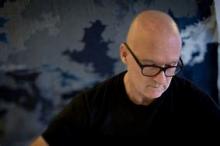
Contemporary American sculptor and installation artist Jim Hodges will present the keynote address for the inaugural Keithley Symposium. In his address, he will reflect on his experiences of The Thinker at the CMA. Since he first encountered it at the CMA’s south entrance in 2012, this work has raised questions for Hodges about art’s power in relation to its original function. Now 6 years later, Hodges’s own sculpture, Untitled (bridge of harmony) sits on the north lawn in the CMA’s Donna and Stewart Kohl Sculpture Garden, where it was installed in 2014. Hodges considers the potential for liveness in objects and the role of museums in making that liveness possible through their stewardship and the narratives they create.
2018 Keithley Symposium – Life an Object: The Thinker as Prism
September 28th, 2018

Inspired by Rodin’s The Thinker, the Keithley Symposium offers an exploration of the birth, lives and afterlives of objects. The event honors the sculpture’s centennial and remarks upon its layered history, and includes interdisciplinary conversations about how we interpret impermanence and what it means to our communities through works of art. The daylong symposium will consist of three panels of scholars, artists, conservators, and curators, and a series of concurrent gallery workshops.
Faculty-Work-in-Progress – Ex nihilo / In nihilum: Contending with Medieval Void
October 3rd, 2018
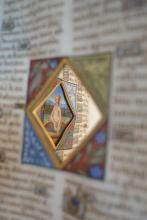
Nature, medieval philosophers exclaimed in an unsteady chorus, abhors a vacuum. Medieval art, exclaims a much more assured collective scholarly voice, equally abhors the same: hence, the notion of horror vacui, the fear of empty space, is often construed as a definitive feature of Gothic material culture in its many manifestations. In her lecture, Elina Gertsman, Professor in the Department of Art History and Art, explores complex conversations among philosophy, physics, mathematics, piety, and image-making in order to suggest that late medieval art, in its constant attempts to grapple with the unrepresentability of the invisible, is in fact predicated on new engagements with emptiness, holes, and erasures.
2018 Issa Lecture – The Quest for Environmental and Climate Justice: Why Race and Place Still Matter
October 16th, 2018
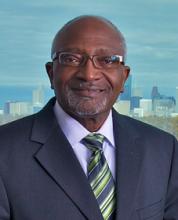
Climate change is the defining global environmental justice, human rights and public health issue of the twenty-first century. The most vulnerable populations will suffer the earliest and most damaging setbacks because of where they live, their limited income and economic means, and their lack of access to health care. Climate-sensitive hazards are forecast to increase in the coming years. However, not all of the populations residing within these hazard zones have the same capacity to prepare for, respond to, cope with, and rebound from disaster events. Professor Robert D. Bullard’s presentation will focus primarily on the need for empowering vulnerable populations, identifying environmental justice and climate change “hot-spot” zones and designing fair, just and effective adaptation, mitigation, emergency management and community resilience and disaster recovery strategies. He will also discuss his book, The Wrong Complexion for Protection, which analyzes more than eight decades of government response to natural and human-made disasters. He will offer strategies to dismantle institutional policies and practices that create, exacerbate and perpetuate inequality and vulnerability before and after disasters strike.
Faculty-Work-in-Progress – Why Black not Blue? Revising & Reimagining Children’s Picture Books in the Age of the #WeNeedDiverseBooks Movement
October 30th, 2018
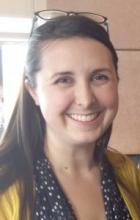
Is the cat in Dr. Seuss’s The Cat in the Hat Black? Is presenting images of enslaved people smiling ever appropriate in children’s literature? What is the impact of personifying a bad mood in blackface in a picture book? In this presentation, Cara Byrne, a Lecturer in the Department of English and the Research Advisor on Diverse Children’s Literature for the Schubert Center for Child Studies, will explore recent controversies surrounding picture books for young readers, including The Bad Mood and the Stick, A Birthday Cake for George Washington, and Islandborn. She will analyze how the current #WeNeedDiverseBooks movement both advocates for increased representation of children of diverse racial, cultural, and ethnic backgrounds and encourages a deeper understanding of how illustrative art possesses its own complex ties to racist tropes in children’s literature.
2018 Richard N. Campen Lecture in Architecture and Sculpture – Material Performance and Ecological Priorities
November 5th, 2018
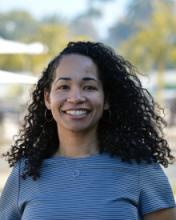
As society contends with rising concerns over the viability of our ecosystems, the convergence of human and ecological priorities is increasingly evident. Architecture bears a long history of prioritizing the needs and desires of human experience, including the provision of shelter, creation of community, and design of conditions for physical comfort and human health. Over the past several decades, architecture has responded to challenges of sustainability, seeking to minimize the overall environmental impact of buildings and establish new metrics of energy performance. These measures increasingly acknowledge the impact of buildings on the biosphere. However, these standards and principles do not yet fully embrace the fundamental alignment of human and natural contexts. In her lecture, Rashida Ng, department chair and associate professor at the Tyler School of Art at Temple University, will present research and design work that expands the concept of material performance to include aspirations of environmental remediation to reverse the destructive consequences of our previous (and current) practices.
- Home
- Events
- Past Events
- 2018-2019

